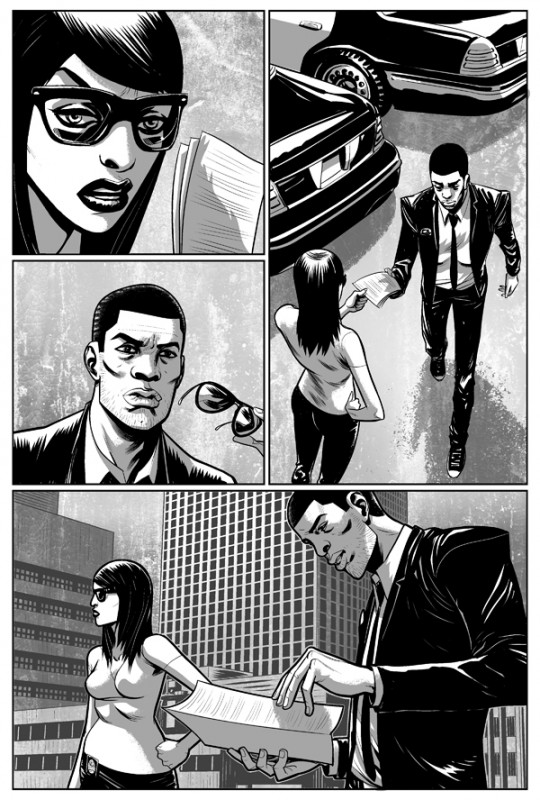
99 Days: Hooked on Mobb-phonics
September 6th, 2011 by david brothers | Tags: kristian donaldson, matteo casaliI’m reading 99 Days by Matteo Casali and Kristian Donaldson and it’s sort of driving me crazy. It’s not bad, exactly. The cover’s great, and the art is pretty good. There are just a few minor things that are crawling under my skin and making me put off finishing up the book.

I’m 40 or so pages in, and the word/phrase “knowwhuti’msayin'” keeps popping up and it’s always italicized. Setting aside my feelings on seeing that phrase in print aside–psyche, all of my opinions must be expressed lest they be lost to the ages. “Nahmean” and “namsaying” scan a lot better in written dialogue (and speech, arguably) and they mean/represent just about the exact same thing in terms of cultural/location/demographics. Close enough for gov’t work, at any rate, right?
The italics and compressed nature of the compound word makes it annoying to see in text. It’s like a full stop when reading. It kills the momentum of the dialogue dead, and it’s so generic and… graceless, I guess. The gold standard for natural black dialogue (dialogue in general, really) in comics is easily Garth Ennis, with Azzarello taking the crown for lyrical dialogue. There’s a flow and rhythm to their dialogue that pushes you deeper into the story. You dance from character to character. In 99 Days… you don’t. As soon as you hit this cat saying “Estelle was mah bitch, so what? I loved her, nigga. She was cool with me and I was cool with her, knowwhutI’msayin’?” or whatever, you just stop dead.
It’s boring, it’s graceless, it’s dunn language for dummies. You’re overdoing it, when the post path to take is to give us a little and let us fill in the rest. “Estelle was my bitch, nigga!” still doesn’t scan quite right, it doesn’t feel right, but it feels better than what we got. I dunno, maybe I expect too much, but I don’t think so. If you overdo the vernacular, you make it more likely that it’ll feel less real, and that’s murder on a comic.
So’s this, from a character a bit earlier in the book: “¿Cómo puedes estar parado a este individuo, ese? Qué tonto–”
And I get it, she’s talking about how another hispanic cat can ride around with as stereotyped of a white racist cop as you’ll see (he rants about quotas or affirmative action, butt kissing, blah blah talking points). But the Spanish is wrong, isn’t it? It’s been a few years, and I don’t really speak Mexican Spanish (¡Vamos, Madrileños!), but I’m like 99% sure parado doesn’t work like that. Parado/parar has to do with stopping or being stopped. Google Translate tells me that it comes out as “How can you stand this guy?”–which makes me think that “estar parado” should’ve been rendered as some form of soportar–support/endure. Unless “estar parado” is something specific to Los Angeles Spanish, but I sorta doubt it.
Bam: yanked right out of the story.
More verisimilitude killers: Casali overdos the specificity of the dialogue, rendering each inflection and non-traditional syllable, but underdos it when it comes to talking about the Crips and Bloods. There are several references to “the Crips leader” and “the rival Blood gang” for example, and my thought was… which Crips? Which Bloods? It’s not one giant organization. There’s not just one giant Crips gang with one cat sending down instructions like a CEO. There’s a ton, sorted by neighborhood or group or history or whatever whatever.
Here is where specificity, or going real specific with a fake gang, would’ve been a boon. “Word on the street is that the Eight Deuce Inglewood Crowns are out for blood because some fool from the blah blah blah set did blah blah blah.” Instead, we’ve got… I can’t even think of a good comparison here. “Talk to the European leader before all these Europeans kill all these Africans!” I guess. (This racism is killing me inside.) Anyway: Make up a gang! It worked for The Shield and Grand Theft Auto (and probably a lot of rappers).
99 Days isn’t a bad book, judging by the little I’ve read, but apparently this stuff was bugging me enough to a) put it down for a while and b) write about it on my lunch break.
Art’s real nice, though. Check out the first four rows on Donaldson’s site to see some pretty black and white images. I pulled the one at the top of this post from that page because I liked the faces.

I could not agree more about how dialogue like that betrays its lack of research or of being read aloud. Everytime I see “s’up,” I want to die, especially because it’s clear what that writer was going for.
Re: the Spanish, the best phrasing would have been “No se como aguantas a esa persona?” Literally translated, it’s “How can you put up with that person,” but as is often the case with idioms, it can’t literally transfer among languages, but the meaning can.